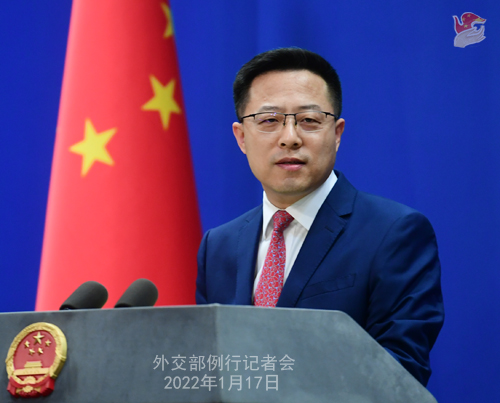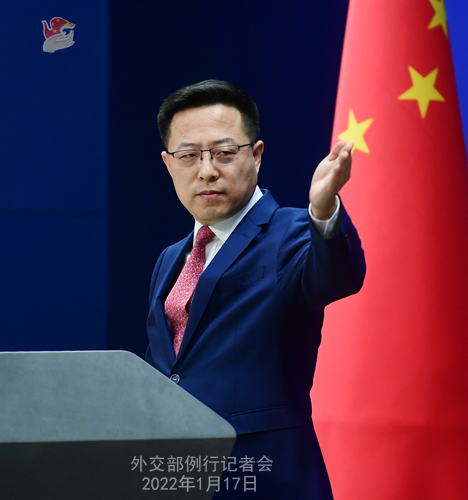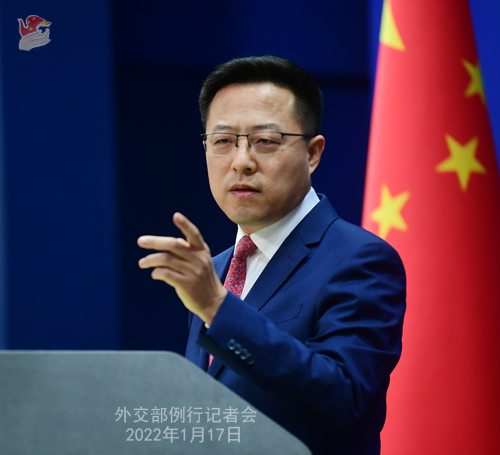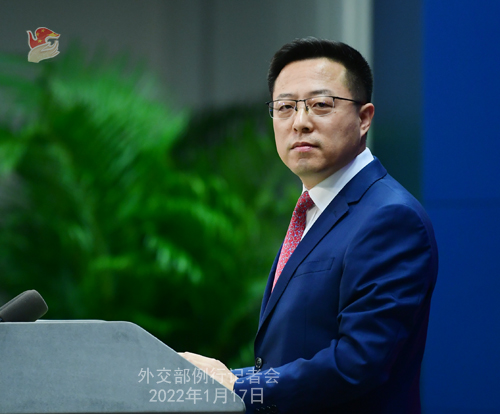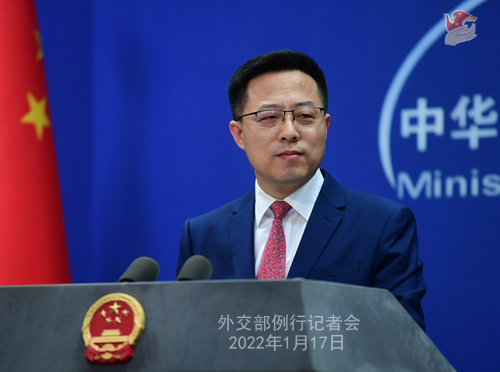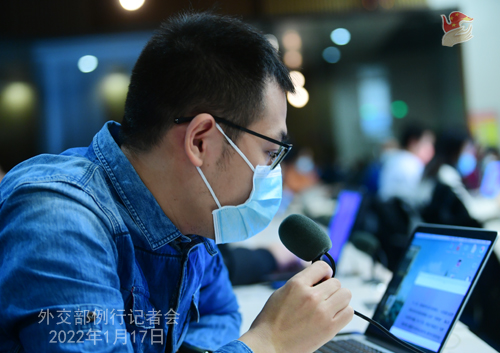| Foreign Ministry Spokesperson Zhao Lijian’s Regular Press Conference on January 17, 2022 |
|
|
| 2022-01-17 19:06 |
|
CCTV: On January 14, Iranian Foreign Minister Hossein Amir-Abdollahian tweeted in Chinese that he is delighted to start his first visit to China after taking office at the beginning of the New Year. He exchanged views with State Councilor and Foreign Minister Wang Yi on a wide range of issues including the comprehensive cooperation plan and reached important consensus. As the Chinese Year of the Tiger is approaching, he hopes that bilateral ties will grow by leaps and bounds in their second 50 years and that the Beijing Winter Olympics will bring great vitality to the world amid the pandemic. Could you share more information with us? Zhao Lijian: Thumbs up for the Chinese Twitter post by Iranian Foreign Minister Hossein Amir Abdollahian. On January 14, Chinese State Councilor and Foreign Minister Wang Yi held talks with him in Wuxi, Jiangsu Province. The two sides jointly announced the launch of the implementation of the comprehensive cooperation plan and agreed to step up cooperation in energy, infrastructure, production capacity, science and technology, medical and health care, expand cooperation in agriculture, fisheries, cyber security and third-party markets, and deepen people-to-people and cultural exchanges including education, film and personnel training to deliver more tangible outcomes of cooperation. State Councilor Wang said that over the past year, China and Iran, under the guidance of the two heads of state, took the 50th anniversary of the establishment of diplomatic ties as an opportunity to strengthen solidarity and cooperation and deepen political mutual trust, making new achievements in bilateral relations. China stands ready to work with Iran to constantly enrich the two sides’ comprehensive strategic partnership, and open a new 50-year period for the development of bilateral relations. China will continue to make utmost efforts to provide vaccines for Iran to help the country defeat COVID-19. China firmly opposes illegal unilateral sanctions against Iran, political manipulation on human rights and other issues, and gross interference in the internal affairs of Iran and other regional countries. China will firmly support the process of negotiations on resuming compliance with the JCPOA, and continue to constructively participate in the follow-up negotiations. China hopes that all parties will overcome difficulties, work in the same direction, and adhere to moving forward the political and diplomatic settlement process. Foreign Minister Hossein Amir-Abdollahian spoke highly of the celebration of the 50th anniversary of the establishment of diplomatic ties and the signing of the comprehensive cooperation plan between the two countries last year, and thanked China for providing strong support for Iran in its fight against COVID-19. He said that Iran is firmly committed to the one-China policy, highly appreciates and will actively participate in the Belt and Road cooperation, firmly commits itself to promoting Iran-China cooperation, supports China in hosting a successful Beijing Olympic Winter Games, and will work with China to jointly oppose bullying acts and unilateral sanctions.
Xinhua News Agency: Juan Antonio Samaranch, Chairman of the International Olympic Committee (IOC) Coordination Commission for the Beijing 2022 Olympic Winter Games, praised in an interview the steps taken to make the Beijing Winter Olympics green, saying it will be the greenest Games. Do you have any comment? Zhao Lijian: Just as Chairman Juan Antonio Samaranch said, one of the most distinctive features of this Beijing Winter Olympic Games is green and environment-friendly. All 26 venues in the three competition zones will be powered 100% by green energy for the first time in history, which means that Beijing will save 4.9 million tonnes of standard coal and reduce 12.8 million tonnes of carbon dioxide every year. It’s fair to say that China has fully acted on the philosophy of hosting a green Olympic Games. This is part of our effort not only to deliver on the promise of carbon peaking and carbon neutrality, but also to offer China’s solution, wisdom and contribution to the world on how to approach the relationship between man and nature as well as development and environmental protection. Does anyone here know where the green electricity for the Winter Olympic venues comes from? (A journalist answered: Zhangbei.) That’s right. It’s from Zhangbei, Hebei Province. There is a folk saying in Zhangbei that “The gale blows once a year, lasting from spring to winter.” We have put in place the Zhangbei renewable energy flexible DC grid test and demonstration project to convert all that wind energy into clean electricity and transmit it to the three competition zones in Beijing, Yanqing and Zhangjiakou through the northern Hebei grid. Besides the Olympic venues, it also lights up numerous households in Beijing. It is a story of brightening Beijing with Zhangbei wind power. The charm of a green Beijing Winter Olympics is also manifested by China’s sincere vision of “Sustainability for the Future”. I’ll give you another example. If you visit the Winter Olympic Forest Park in Zhangshanying, Yanqing district, you will see that many trees have their own QR code showing their unique identity. If you scan the codes, they will tell you that the trees were transplanted there when the competition venues were being built in Yanqing. With ex-situ conservation as a form of ecological compensation, we have kept the competition zone green and added a vivid footnote to the philosophy of hosting a green Olympics. In less than 20 days, the curtain will rise on the Beijing Olympics. The beautiful scroll of a green Olympics is gradually rolling out with more splendor to be revealed. Like all of you, I am looking forward to the Games with great expectation.
People’s Daily: Former Singaporean diplomat Kishore Mahbubani said not long ago that a British business executive told him that the British intelligence had planted their people in Huawei, who “scrubbed” everything, only to find out that Huawei is not a threat. But several months later, the UK “capitulated” under US pressure. So far the British government hasn’t responded yet. Do you have any comment? Zhao Lijian: I noted relevant reports. Just like you, I wonder how the UK side will explain it. I also noted that British media recently commented that the decision of banning Huawei will seriously stall UK’s 5G rollout targets. Oliver Dowden, Minister without Portfolio and former Secretary of State for Digital, Culture, Media and Sport, said the decision to remove Huawei has led to “a cumulative delay to 5G rollout of two to three years”. A survey by Oxford Economics shows that restricting a key supplier of 5G infrastructure like Huawei from helping to build UK’s network would increase that country’s 5G investment costs by between 9% and 29% over the next decade. Driven by selfish political gains, certain individuals and forces in the UK have fawned on a certain country and overstretched the concept of national security to suppress a specific Chinese company at the cost of their own people’s access to 5G technology. Such acts harm others without benefiting itself. ARD German Television: The German warship, the frigate Bavaria, just left the Pacific. What is China’s assessment of the mission of the Bavaria frigate? And why wasn’t it allowed to dock in Shanghai? Zhao Lijian: We have noted the so-called cruise of the German warship in the South China Sea. The Chinese side has made clear its position on this repeatedly. We hope Germany’s practice is not grandstanding, but will rather be conducive to regional peace and stability.
Shenzhen TV: An underwater volcano off Tonga erupted on January 15, causing serious losses. Has China offered any assistance to Tonga? Zhao Lijian: China is closely monitoring the disaster of volcanic eruption in Tonga and has expressed deep sympathies and sincere condolences to the government and people of Tonga. The Red Cross Society of China decided to provide US$100,000 of emergency humanitarian aid in cash to the Tongan side. The Chinese side will offer assistance to the best of its capability based on the situation and the needs of Tonga. We believe that the Tongan government and people will rise above the disaster and rebuild their homeland soon. CNR: Russian Foreign Minister Sergei Lavrov answered questions on China-Russia high-level exchange and strategic coordination at an annual press conference on January 14. He spoke highly of the bilateral ties, saying the “unique architecture” of all-round cooperation exists only with China. He also said that the two countries, working friendly with other countries at the UN Security Council and its affiliated agencies, have jointly defended international law and international equity and justice. Russia and China have similar positions on many international and regional issues including the Iranian nuclear issue, Afghanistan and Central Asia. Do you have any comment? Zhao Lijian: We have noted with high appreciation Foreign Minister Lavrov’s positive remarks on China-Russia relations. As we’ve stated repeatedly, China-Russia relations enjoy boundless potential and bilateral strategic cooperation covers all areas. The two countries have established high-level exchange mechanisms including heads of state’s annual exchange, premier and prime minister’s regular meeting, and cooperation between legislative bodies. The five inter-governmental cooperation committees at the vice-premier (prime minister) level are in efficient operation. Consultation between the Director of the General Office of the CPC Central Committee and the Chief of Staff of the Presidential Executive Office of Russia, strategic security consultation, and the law enforcement security cooperation mechanism are all being constantly enriched. New outcomes are achieved in dozens of sub-committees for cooperation. Just as Foreign Minister Lavrov put it, our all-round cooperation architecture is indeed unique. As permanent members of the UN Security Council and responsible major countries, China and Russia are both committed to safeguarding the UN-centered international system and the international order based on international law, improving global governance and facilitating the political resolution of regional and international hotspot issues. Against the complicated international landscape, the two countries stand as a valuable source of stability and positive energy. Both believe that international affairs should be handled through consultation by all countries and that the world needs openness and win-win cooperation, not isolation or zero-sum confrontation. This is the overwhelming trend that has strong popular support. China stands ready to work together with Russia and the rest of the international community to practice true multilateralism, work for greater democracy in international relations and make greater contributions to building a new type of international relations and forging a community with a shared future for mankind.
Bloomberg: It’s been reported that the DPRK sent a freight train to Dandong over the weekend, and that returned to the DPRK today. Can the Chinese Foreign Ministry confirm this? And does this mean the reopening of the China-DPRK border is continuing to take place? Zhao Lijian: China-DPRK rail freight was suspended for some time due to the impact of COVID-19. Through friendly consultations between the two sides, the cross-border rail freight transport between Dandong and Sinuiju has resumed. The two sides will move forward on the basis of ensuring sound epidemic prevention and control to facilitate normal bilateral trade. Reuters: South Korea’s military said that North Korea fired two suspected short-range ballistic missiles on Monday. Does the Foreign Ministry have any comment? Zhao Lijian: China has noted relevant reports and recent developments on all sides involved in the situation on the Korean Peninsula. The situation on the Peninsula hasn’t come to where it is with no reason. We urge relevant parties to keep in mind the big picture of peace and stability of the Peninsula, adhere to the right direction of dialogue and consultation, and work in concert to advance the political resolution process of the Peninsula issue. AFP: The international community has expressed alarm over Russia’s troop build-up on the Ukrainian border and the possibility of an invasion by Moscow. Given China’s long-held non-interference policy, is Beijing similarly concerned about any attempt to change Ukraine’s sovereign status by force? Zhao Lijian: China’s position on the Ukraine issue is consistent and clear, and remains unchanged. We embrace a vision of common, comprehensive, cooperative and sustainable global security, advocate balanced and just treatment of security concerns and security initiatives of relevant countries, and resolve differences through dialogue and consultation.
ARD German Television: People in foreign countries looking ahead to the Beijing Olympics have a focus on the pandemic situation here. We have learned that we have several clusters, Omicron is approaching, and there are fears, especially in Germany, when I talk to athletes and other people. They say, can we have safe travels to the Beijing 2022 Olympics? How will the situation develop? Zhao Lijian: To start with, I’d like to thank you for your interest in China’s fight against COVID-19. I believe most of you here have been in China for a long time and have witnessed firsthand how China has combated the epidemic. You may compare the numbers of confirmed COVID-19 cases in China and other countries, including the US. There are publicly available statistics, including from the Johns Hopkins University and many other sources. The sheer contrast can tell a lot. It’s fair to say that China has achieved a strategic victory in the fight against COVID-19. That said, we are confronted with a new surge of COVID-19, especially the “tsunami” caused by the Omicron variant. Even in China, sporadic and individual cases have been reported, for example in Tianjin. In response, comprehensive and effective measures have been taken. According to expert assessment, the epidemic in Tianjin will soon be contained. You must have noted that there is also a case of Omicron in Haidian District, Beijing. To my knowledge, investigations and extensive screening have not shown a second case so far, which may strike you as odd, but that’s the fact. I’m fully convinced that as the Chinese government and people have put in place the comprehensive and effective dynamic zero-COVID policy under the leadership of the CPC, you can rest assured that there will be sound epidemic prevention measures for the Beijing Winter Olympics. I hope that with your pens and cameras, you will bring what you see in China to your audience at home, and share what is happening here as it is with athletes and other people in your countries. We always say that the Beijing Winter Olympic Games will be streamlined, safe and splendid. The first and foremost thing is to ensure safety.
|
| ||||||||||
|
||||||||||
|
|
